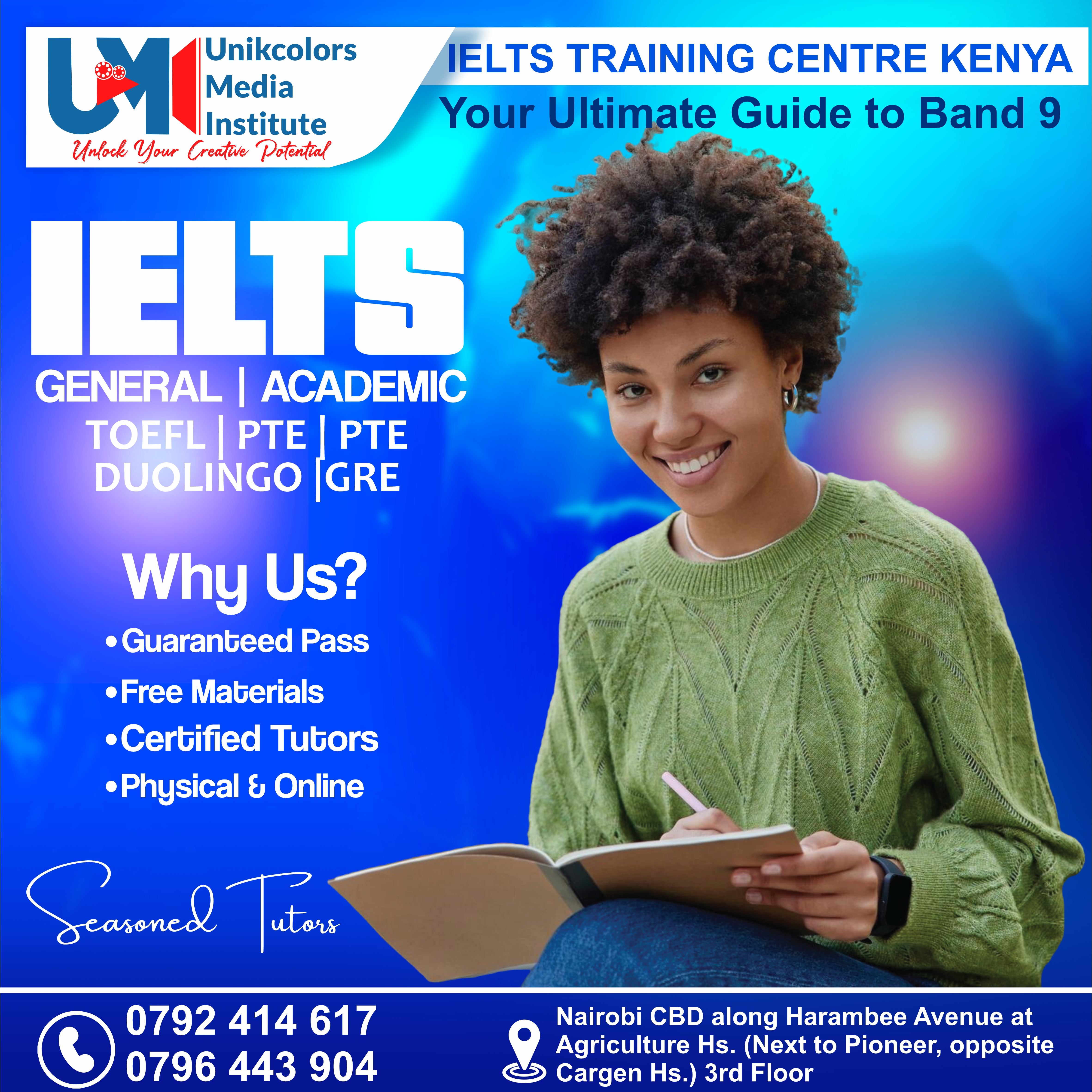IELTS TRAINING CENTRE KENYA - IELTS PREPARATION | OET | TOEFL | PTE | GRE | DUOLINGO

Title: IELTS TRAINING CENTRE KENYA - IELTS PREPARATION | OET | TOEFL | PTE | GRE | DUOLINGO
Vocabulary for IELTS
Learning IELTS Vocabulary – The Why, what and how?
Preparing for IELTS? Then, you need to start boosting your vocabulary for IELTS! In this blog, I’ll explain why vocabulary is so important, tell you what kind of words you need to learn and suggest the best ways to learn it.
Let’s go! First things first…
Why do I need to build my vocabulary for IELTS?
A basic principle of language testing is often overlooked when test takers and teachers are scrambling around for shortcuts and tricks and hacks. The principle is this:
The better your language level, the better your score.
This is true of all skills; reading, writing, listening and speaking. Let’s use reading as an example though. Research suggests that, in order to understand a text, a reader needs to know between 95-98% of the words in it. That’s a LOT of words! Think about the last IELTS Reading text you saw. Did you know this much?
If you’re studying at an intermediate level in a General English course, for instance, most of the reading you’re doing is ‘graded’. In other words, it’s been edited to be easier to understand for a learner at that level. With that editing, intermediate learners should be able to understand the text without too much difficulty.
When it comes to IELTS, the texts are mostly at a C1/C2 level (i.e advanced). Learners at this level should generally know between 8000 and 16000 words. So, if you’ve got a B1 level vocabulary, it’s unlikely that you’re going to understand enough of a C1 text to be able to answer the questions.
Don’t be disheartened! It doesn’t mean you’ll NEVER be able to understand – it just means you need to factor vocabulary growth into your test preparation.
For the other skills, the same basic principle applies; the more language you know, the better your score will be.
So that covers the Why, let’s look at the What.
What vocabulary do I need to know?
This is where things get interesting. If you were preparing for the OET, you’d be focussing on building vocabulary around health and medical matters. For IELTS, however, there are so many topics you might encounter: health, science, environment, education, space…
With that in mind, there are three key areas that you need to consider when building your vocabulary for an IELTS exam:
High-frequency words
Firstly, you need to get across the most frequent words in English. You can find over 2000 of these in the General Service List or the New General Service List. The good news is that you probably already know most of these. Words like the, good, bad, idea are in the top 2000. And if want to check, you can grab the word list from the Vocabulary section of our IELTS course on E2Language.com.
Academic Words
The other important place to look for your vocabulary is to the academic field. And again, luckily, some absolute legend (Averil Coxhead) compiled the most useful 570 of these into the Academic Word List, which you can also find in the E2 IELTS Vocabulary section. The list contains words that commonly appear in academic texts, such as research, theory, initial, acquire and valid.
Technical / Topic-Specific words
The 2000 most frequent words in English plus the Academic Wordlist account for around 85% of most IELTS reading texts. The other 15% is made up of what we’ll call technical or topic-specific words. If you were reading a text about animals, for example, this might include words like habitat, predators, livestock, foraging and captive. Learning this kind of language involves either extensive reading on your part, careful curation by your teacher or, ideally, a combination of both. In other words, to learn this kind of language, you need to be consuming a lot of English input.
That’s right. Learning vocabulary involves more than simply downloading a word list. This brings us to the big question….
How can I learn new vocabulary?
While it’s nice to have, a list of words prepared by someone else isn’t going to do much to boost your vocabulary. What you need, according to vocabulary guru Paul Nation, is deliberate learning and incidental learning.
Deliberate learning
This is what happens when you’re totally focused on learning vocabulary. You might be looking up a meaning, writing out a translation, preparing an example sentence, practicing the spelling or pronunciation. Deliberate vocabulary learning is an important part of vocabulary boosting. In any good IELTS course, you’ll spend a fair bit of time on this.
Incidental learning
This is what happens when you’re focusing on something else besides learning vocabulary. Perhaps you’re reading the newspaper, listening to a podcast, watching a movie, doing a practice IELTS test or chatting with a friend – and you just happen to bump into a word you’ve met before. The more you ‘bump into’ these words in different contexts (i.e. not just on a word list!), the stronger your understanding of them will be.
Come along to our live classes and make use of our huge library of resources in our IELTS preparation course and G.R.O.W your vocabulary for IELTS with Unikcolors Media Institute.
